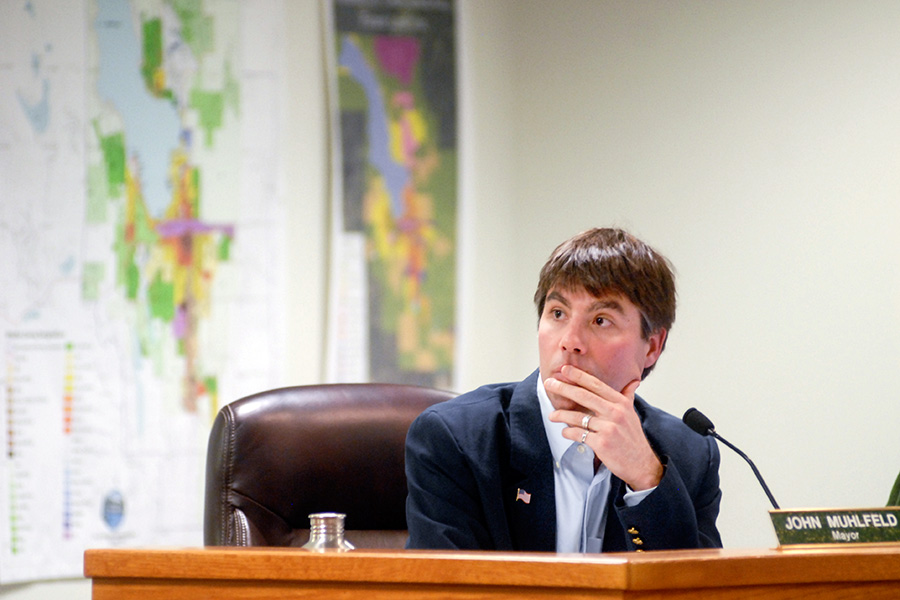Whitefish city leaders have requested the removal of two county planning board members whose “foul language” at a May 10 public meeting included references to the “Whitefish Nazis,” according to a recent letter.
In the letter dated June 6, Whitefish Mayor John Muhlfeld and all six members of the city council requested the Flathead County Commissioners censure the planning board members for their remarks and asked “that they either be removed from the Planning Board or be required to recuse themselves from any planning decisions that may have an impact on the City of Whitefish.”
The letter continued, “We believe their mere presence on the Planning Board will continue to taint any decision/recommendation of the Board as a whole.”
The public hearing that prompted the city’s request dealt with a proposed corridor plan along Highway 93 south of Whitefish, in a contentious area known as the “doughnut.”
Whitefish and the county have long fought over planning rights in the area, with the state Supreme Court eventually siding with the county in a 2014 ruling. Since then, the land has been under county control.
The city of Whitefish offered to work with Flathead County on its 93 South Corridor Plan in an effort to “find a mutually acceptable solution for zoning in this important area,” which serves as the gateway to the resort community, a request the county flatly rejected.
On May 10, the impasse was on full display when the conversation turned toward whether the proposed zoning changes in the corridor were in keeping with Whitefish’s more stringent standards, which set off board members Greg Stevens and Rita Hall, the latter who compared Whitefish’s style of governance to “Nazis overseeing what we’re doing.”
She continued, “The Whitefish Nazis are watching us very, very carefully. And the Montana Supreme Court said the county has jurisdiction of zoning of the doughnut, yet we are submitting to Whitefish in so many ways. This is a quagmire. We all know that.”
For his part, Stevens said, “It’s obvious what the hell is going on. People in the city are trying to foist their future land maps upon the county residents. They are protecting those businesses inside the city limits of Whitefish, and they are stifling every kind of business outside the city limits of Whitefish. That’s what’s going on.”
The comments elicited a strongly worded missive from Whitefish city leaders, who noted that Hall’s statement was especially insensitive given that the community had recently been the target of rampant anti-Semitism unleashed by a neo-Nazi website.
“To refer to any of our citizens, elected or otherwise, as Nazis is unconscionable, especially given the turmoil over the actions of self-styled Nazis/white supremacists recently focused on Whitefish, its businesses and many of our citizens,” the letter states. “We need not remind you that the citizens of Whitefish are also residents and tax payers of Flathead County. As such, they should be afforded the same respect and consideration that any County resident, regardless of their address or position on an issue before the Planning Board.”
The letter continues: “It is clear … that these two Planning Board members have articulated their animus, bias and prejudice toward the City of Whitefish, its citizens, elected officials and staff and are unquestionably compromised in their ability to be objective in evaluating planning issues involving the City of Whitefish.”
City leaders also wrote that “it is little wonder that citizens are reluctant to participate in the planning process, knowing they may be subjected to such outbursts by appointed officials.”
The county planning board is composed of residents who are appointed by the commissioners to the volunteer steering group.
County Commissioner Phil Mitchell confirmed that the board had received the city’s letter, and said an attorney is currently drafting a response.
“It’s with our attorney and I have not seen the response yet,” Mitchell told the Beacon. “I think our legal counsel needs to give us some thoughts, but at the end of the day I believe it is our job to determine whether someone overstepped their boundaries.”
Mitchell, a former member of the Whitefish City Council, said he listened to a recording of the public hearing and the controversial comments at the center of the city’s request, but still needed to consider a multitude of issues.
“I think we need to be respectful,” Mitchell said. “Does that mean we need to remove someone from their job? I don’t know about that.”
Mitchell also said the city of Whitefish seems to be harboring resentment because it no longer has planning control over the embattled “doughnut.”
“Part of this has to do with Whitefish not understanding what their role is anymore in terms of what they can do and can’t do,” he said. “It’s typical Whitefish.”
